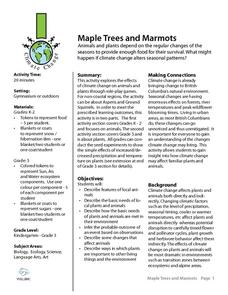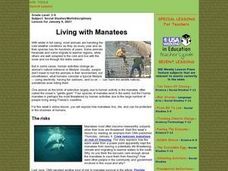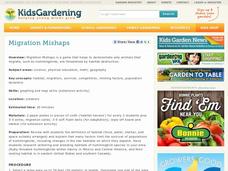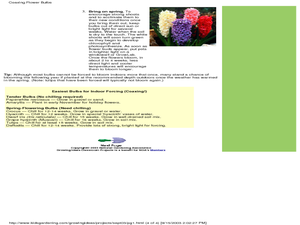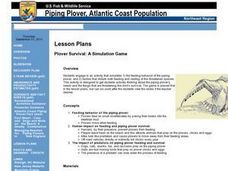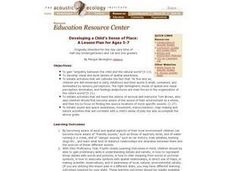Teach Engineering
Dress for Success
Dressing for success is not always about looking sharp. Sometimes it is about staying warm and dry. Present your class with an activity that challenges groups of pupils to design a layered material for blizzard conditions. The teams test...
Curated OER
Ocean Grazers: Class Field Trip
Students explore biology by participating in a field trip. In this oceanography lesson, students define the survival characteristics of bottom dwelling creatures also known as ocean grazers. Students attend a class field trip to a beach...
Curated OER
Prairie Find Outdoors
Students take a field trip to a local prairie. Using identification books, they identify various forbs and grasses in the prairie. As a class, they discuss the importance of forbs and grasses to the ecosystem and review the various types...
Desert Discovery
Leaping Lizards
Here is a fine biology instructional activity that introduces youngsters to reptiles. They study their feeding habits, their habitats, and the adaptations they must make to survive in their environments. The outstanding instructional...
Alabama Wildlife Federation
Wildlife Habitat Checklist
Take a walk on the wild side with a project about animal habitats. After kids observe a chosen animal in its home, they describe the animal's food and water sources, shelter, and how it raises its young. They then write a short fictional...
Curated OER
Gotta-Have Gear Scramble
In this activity instructional activity, students unscramble words of items hikers should always pack for a hiking trip. After unscrambling the words, students draw a line matching each word to its definition. Students also calculate...
Wild BC
Maple Trees and Marmots
Kinesthetic activities simulate animal activity as the seasons progress in a lesson that introduces climate change to primary pupils. The kids role-play maple trees collecting what they need to survive, but as each year comes around, the...
Curated OER
Bird Brilliance!
First graders explore natural resources and search outdoors to find materials to create a bird's nest. In this bird's natural resources instructional activity, 1st graders listen to a book about birds and reflect on the various things...
Curated OER
Living with Manatees
Students research the lives of manatees and how humans are contributing to their survival. They visit a variety of websites including a webcam.
Curated OER
Turtle Hurdles
Students explore physical education by researching biology. In this survival techniques lesson, students discuss the methods turtles use to survive dangerous encounters and conduct a sea turtle role play exercise. Students identify the...
Curated OER
Arthropods At "Home"
Learners discover what an arthropod is and how they survive in our world. In this insect lesson, students read the book, A House Is A House For Me, and compare a home for a person with the type of habitat an arthropod lives in....
National Gardening Association
Migration Mishaps
Elementary ecologists pretend to be migratory hummingbirds. They fly between wintering and nesting grounds, trying to reach a habitat haven. In a musical-chair fashion, some birds will miss out, and are removed from the game. To further...
Curated OER
Coaxing Flower Bulbs
Students complete an experiment for coaxing flower bulbs into growth. In this flower growth instructional activity, students research various types of flower bulbs that may be used to complete a coaxing experiment. Students then complete...
Curated OER
Explore: 2nd Grade Camouflage
Second graders discuss camouflaging in animals. They create camouflaged animal artwork out of various craft and art supplies and then see how well the creation blends into an outdoor area.
Curated OER
Hypothermia: Temperature Changes Under Varying Conditions
Students conduct an experiment to determine what type of clothing would be most suitable for outdoor activities. They determine the temperature changes of the skin under various wet clothing materials and graph the temperature changes. ...
Curated OER
Please the Trees, But Not These, Please!
Students study trees. In this forestry lesson, students complete a variety of activities where they learn the basic parts of a tree and their functions.
Curated OER
Gaia: The Wisdom of the Earth
Learners are introduced to Gaia theory of natural homeostasis. They graph Earth's temperatures over time, construct terrariums or monitor the outdoor environment. Related videos titles are suggested, but may be outdated. The objectives...
Curated OER
Plover Survival: A Simulation Game
Seventh graders engage in a simulation that explains the feeding behavior of the piping plover and the things that disturb the feeding and nesting of this species.
Chicago Botanic Garden
Nature Walk and Ecosystem Introduction
A food web has no organism higher than a tertiary consumer because there wouldn't be enough energy left to sustain them. The fourth installment in a seven-part series begins with a nature walk to get pupils thinking about their...
Curated OER
Insects!
Students explore the diet of insects. In this "insects" biology lesson, students take a nature walk and collect various natural materials they think may be eaten by insects. Students sort and classify these materials into three diet...
Curated OER
What Makes a Cat a Cat?
Learners investigate the lives of pets by videotaping them. In this animal life lesson, students videotape a cat and other pets using school cameras in a computer lab. Learners review the footage from the cat and other animals and...
Curated OER
Beaver Ecology
Learners explore the lives of bgeahvers. They identify the physical and behavioral adaptations that help beavers survive in their environment. Students compare and contrast how beavers influence the ecology of both forest and aquatic...
Curated OER
Scales, Scutes, and Skins
Students identify the various adaptations of reptiles and amphibians. After distinguishing between reptiles and amphibians, students discuss the ways in which their adaptations aid in their survival. They participate in a hands on...
Curated OER
Developing a Child's Sense of Place
Students develop empathy with the natural world; visual and aural senses of spatial awareness; and initiate sound and space awareness, movement, indoor/outdoor, map-making and nature activities that correlate with a child's sense of play.








